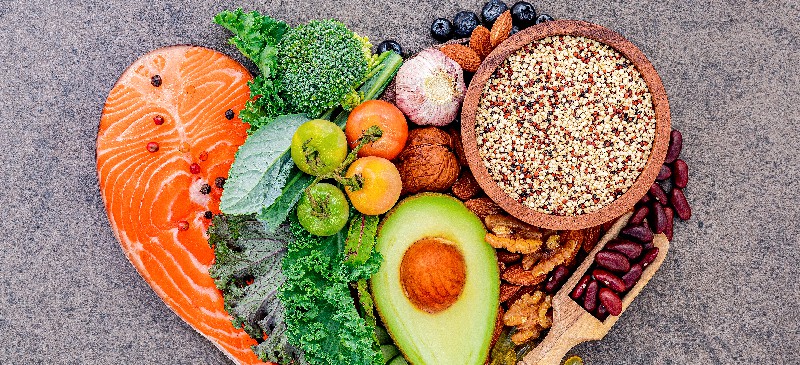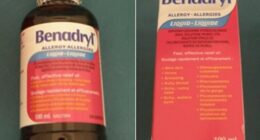Cholesterol is often one of the most misunderstood aspects of heart health. For many people, loading up on the foods that lower cholesterol brings to mind low-fat meals that lack flavor. However, this is not the case.
When it comes to lowering high cholesterol naturally, strictly avoiding all fats and following a low cholesterol diet is not the answer. Even totally avoiding foods that contain cholesterol itself (like eggs or cheese) isn’t necessary either. It’s all about moderation and balance — eating a combination of nutrient-dense foods that fight inflammation and tackle the root of the problem.
These foods that lower cholesterol levels include all sorts of great-tasting fruits, vegetables, legumes, whole grains, fish, lean meats and plenty of nutritious sources of fat, too, making it easier than ever to follow a heart-healthy diet.
Foods that Lower Cholesterol
1. Vegetables (Especially Greens)
No doubt about it, nutrient-dense, anti-inflammatory vegetables are one of the most high-antioxidant foods available. Loaded with phytochemicals that fight free radical damage, they slow down the aging process and keep arteries flexible and healthy. Not surprisingly, studies have found that eating more vegetables is linked to lower LDL cholesterol levels in both men and women.
Many dark leafy greens, like spinach and kale, contain very few calories but offer protection against heart attacks by helping artery walls stay clear of cholesterol buildup. While nearly every type is a good choice, vegetables — including benefit-rich beets, onions, cabbage, broccoli and artichokes — are especially useful for upping your fiber intake and protecting heart health.
Ad

2. Nuts
Nuts of all kinds make a good source of healthy polyunsaturated and monounsaturated fats. They also provide a decent amount of fiber. Certain nuts, including almonds, specifically supply antioxidant flavonoids, plant-based compounds that improve artery health and reduce inflammation.
Studies show nuts can lower “bad” LDL levels, especially in individuals with high cholesterol and diabetes. They can help prevent damage from forming within artery walls and protect against dangerous cholesterol plaque buildup, in addition to fighting weight gain and obesity. One review of 25 studies showed that eating more healthy nuts was associated with lower levels of total and LDL cholesterol, plus decreased triglycerides as well.
3. Chia Seeds and Flaxseeds
Flaxseeds‘ benefits extend to being the richest source of the plant-based omega-3 fatty acid called alpha-linolenic acid (ALA). Both chia seeds and flaxseeds are extremely high in soluble and insoluble fiber, which can support detoxification and gut health and help with weight loss. Studies show that these seeds can reduce both total and LDL cholesterol levels to keep your heart healthy.
The soluble fiber content helps trap fat and cholesterol in the digestive system so that it is unable to be absorbed. Bile is then excreted through the digestive system, forcing the body to make more, using up excess cholesterol in the blood and lowering cholesterol overall. Use some seeds on your oatmeal, yogurt, in baked goods or blended into smoothies.
4. Olive Oil
Olive oil benefits include being another anti-inflammatory ingredient that’s full of heart-healthy monounsaturated fatty acids that lower LDL cholesterol. Extra-virgin olive oil has been shown to drop bad LDL cholesterol levels to enhance heart health.
Use extra virgin olive oil to make homemade salad dressings, add some to sauces, or use it as a flavor-boosting ingredient for stir-fries or marinades.
5. Avocados
Avocados are one of the world’s greatest sources of heart-healthy monounsaturated fat, the type that can help raise HDL cholesterol while lowering LDL. Not only have avocados been shown to increase levels of good HDL cholesterol, but they can also reduce total and bad LDL cholesterol as well.
Avocados also contain high levels of soluble fiber and stabilize blood sugar levels, in addition to supplying anti-inflammatory phytochemicals such as beta-sitosterol, glutathione and lutein. Besides making guacamole, get creative with these avocado recipes and add it to smoothies, salads, eggs or even desserts.
6. Salmon
As one of the world’s best sources of anti-inflammatory omega-3 fats, the nutrition of salmon is also valuable because it’s linked to lower rates of heart disease, cognitive disorders, depression and many other conditions. Studies indicate that omega-3 fatty acids can help decrease cholesterol levels and relieve inflammation to enhance heart health.
Other sources of omega-3 fatty acids include fatty fish like sardines, mackerel and herring. As some of the top foods that lower cholesterol, these fatty fish can also help raise good cholesterol levels while also supporting a healthy weight and better brain function.
7. Gluten-Free Whole Grains/Ancient Grains
Whole grains have been associated with lower levels of cholesterol and improved heart health. However, because gluten is a common sensitivity and can promote inflammation, you may want to focus on gluten-free grains like quinoa, rolled oats, buckwheat and amaranth.
These tend to be easier to digest, can be used in all the same ways as wheat or wheat flour, and provide plenty of nutrients, too. Oats, for example, contain a compound called beta-glucan, a substance that absorbs cholesterol to help enhance heart health.
8. Green Tea
Green tea is considered the number one beverage for anti-aging. Not only is it a rich source of cancer-fighting antioxidants, it’s also supportive for heart health since it prevents LDL cholesterol levels from rising.
Studies show that drinking green tea can decrease levels of total and LDL cholesterol. Studies have also shown that drinking yerba mate tea can naturally improve serum lipid levels, thereby lowering cholesterol levels.
Epidemiological studies also suggest that drinking green tea can help reduce atherosclerosis and risk of heart disease, lower blood pressure, reduce inflammation in arthritis cases, and also improve bone density and brain function.
9. Beans and Legumes
Beans are known for packing in tons of fiber, which slows the rate and amount of absorption of cholesterol. Studies show that a diet rich in legumes such as lentils, beans and peas is linked to lower levels of cholesterol in the blood. They also contain antioxidants and certain beneficial trace minerals that support healthy circulation.
Try nutritious black beans, chickpeas, kidney beans, mung beans and other varieties in soup, salads and, of course, hummus.
10. Turmeric
Consider turmeric the king of all spices when it comes to fighting inflammation. Turmeric benefits include lowering cholesterol, preventing clots, fighting viruses, killing free radicals, increasing immune health, balancing hormones and more.
Turmeric contains the active ingredient called curcumin, which has been studied in regards to protection against numerous inflammatory diseases including heart disease, cancer, ulcerative colitis, arthritis and more. Notably, it has been shown to reduce levels of total and LDL cholesterol in the blood.
11. Garlic
Garlic is one of the most well-researched heart healthy ingredients there is. For example, the benefits of raw garlic has been shown to reverse disease because of its antioxidant, anti-inflammatory, antiviral, antidiabetic and immune-boosting properties. According to one review of 39 studies, consuming garlic regularly for at least two months can lower cholesterol levels to reduce the risk of heart disease.
Garlic has been found to lower cholesterol, prevent blood clots, reduce blood pressure and protect against infections, so use some every day however you can, whether in sauces, soups, roasted veggies or marinades.
12. Sweet Potatoes
Sweet potatoes provide a good dose of filling, artery-sweeping fiber in addition to loads of vitamins and antioxidants. They contain several health-promoting proteins and compounds that have been shown to decrease cholesterol in animal models. They’re also low in calories, low on the glycemic index (which means that they won’t spike your blood sugar) and high in potassium.
13. Persimmon
Often dubbed “the divine fruit,” persimmon fruit is packed with fiber and antioxidants, earning it one of the top spots on the cholesterol lowering foods list. And in recent years, research has uncovered a wealth of potential heart-healthy benefits of this powerful fruit. One study conducted in Japan, for example, found that regularly consuming persimmon fiber for 12 weeks produced significant reductions in LDL cholesterol levels.
14. Okra
Rich in dietary fiber as well as important nutrients like vitamin C, potassium and magnesium, okra doubles as one of the best foods that lower cholesterol and blood sugar simultaneously. Some research suggests that adding a few servings of this superfood to your diet can help you stay within a healthy LDL cholesterol range and fight off heart disease while also balancing blood sugar.
In fact, an animal model published in The Journal of Nutritional Biochemistry showed that treating mice with okra extract not only helped lower cholesterol levels, but also decreased both blood sugar and triglycerides as well.
Cholesterol Lowering Diet Plan
If you’re looking for how to lower cholesterol naturally, there is no shortage of low cholesterol diet plan regimens available online and in bookstores that promise the ability to improve heart health. The DASH Diet, low in sodium and saturated fat, is an option that’s endorsed by the American Heart Association and proven to lower high blood pressure.
What foods do most cholesterol-lowering diets recommend eating versus avoiding? For starters, foods with trans fats and hydrogenated oils can actually increase cholesterol levels and definitely need to stay off the table. In their place, monounsaturated fats (MUFAs) and polyunsaturated fats (PUFAs) are recommended. These include foods that lower cholesterol like avocados, olive oil, nuts and seeds.
Aside from switching up your fat sources, one of the key elements to fighting high cholesterol is eating plenty of high-fiber foods. Fiber is found in all types of whole, real plant foods including vegetables, fruits, whole grains and legumes. Where is fiber missing? In processed foods that are refined and full of sugar — including most breakfast cereals, pastries, breads, rolls, pasta, cookies and granola bars.
When it comes to protein sources, “lean” is usually the name of the game. Healthy lean proteins include pasture-raised poultry like turkey or chicken, wild-caught fish and other seafood, beans and, yes, even eggs.
This way of eating is closely related to the Mediterranean Diet — one of the most highly recommended dietary plans that doctors prescribe to their high-cholesterol patients. People in the countries surrounding the Mediterranean region rely heavily on eating what’s sourced and grown locally rather than packaged foods that are full of refined vegetable oils, sugar, sodium and artificial ingredients.
Historically, levels of heart disease are much lower in these countries than in the U.S., despite the fact that most people still eat a substantial amount of fat. Because of the diversity, flexibility and adaptable approach of this style of eating, it’s easy to begin and to stick with.
Foods to Avoid
The key to lowering heart disease risk factors, including high cholesterol, is reducing inflammation. High cholesterol foods to avoid include:
- packaged foods of all kinds
- sugar
- refined grain products
- processed vegetable oils
- conventional dairy products (non-organic, homogenized and pasteurized)
- farm-raised animal products
- too much caffeine or alcohol
As mentioned above, fiber and antioxidants are crucial for keeping arteries clear and healthy. Increased dietary fiber intake is associated with significantly lower prevalence of cardiovascular disease and lower LDL-cholesterol concentrations. Research also shows that some specific compounds found in plant foods including plant sterols/stanols and isoflavones can help reduce cholesterol levels. Most processed foods are extremely low in both — and the kinds that do have fiber or antioxidants normally contain synthetic, added types.
Poor quality animal products are highly inflammatory, as are toxic oils that are made using chemicals and solvents. Alcohol, sugar and caffeine are all stimulants that the liver can use to produce more cholesterol, increasing levels of inflammation. While these can be okay in small doses (such as 1–2 cups of coffee or a glass of red wine per day), overdoing it can counteract any cardio-protective benefits these ingredients might normally have.
Risks and Side Effects
While adding these foods to your diet can definitely help keep your cholesterol in check, it’s important to combine them with a balanced diet and healthy lifestyle to really optimize heart health. Even on the best cholesterol-lowering diet, adding a few superfoods here and there is unlikely to make much of a difference if you’re not making changes in other parts of your daily regimen.
Minimizing stress levels, exercising regularly, increasing your intake of whole foods, cutting out heavily processed, high cholesterol foods and giving up unhealthy habits like smoking or drinking are just a few other natural ways to keep cholesterol levels under control and support better health.
Final Thoughts
- Cholesterol is a naturally-occurring substance that is essential for overall health. Too much cholesterol, however, can build up in the arteries and increase the risk of heart disease.
- Wondering how to reduce cholesterol without medication? One of the most effective methods for how to lower LDL cholesterol levels is simply switching up your diet to include a few servings of foods that lower cholesterol.
- Vegetables, nut and seeds, fatty fish and legumes are just a few examples of healthy foods that lower cholesterol fast, all of which can be easily incorporated into a variety of low cholesterol recipes.
- Meanwhile, it’s also important to limit your intake of foods that raise cholesterol, such as sugar, processed oils and pre-packaged foods.
- For best results, be sure to pair these diet changes with regular physical activity and a healthy lifestyle.
!function(f,b,e,v,n,t,s)
{if(f.fbq)return;n=f.fbq=function(){n.callMethod?
n.callMethod.apply(n,arguments):n.queue.push(arguments)};
if(!f._fbq)f._fbq=n;n.push=n;n.loaded=!0;n.version=’2.0′;
n.queue=[];t=b.createElement(e);t.async=!0;
t.src=v;s=b.getElementsByTagName(e)[0];
s.parentNode.insertBefore(t,s)}(window, document,’script’,
‘
fbq(‘init’, ‘3475171552810057’);
fbq(‘track’, ‘PageView’);






